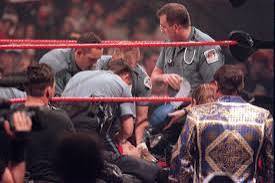The Tragic Deaths of Wrestlers in the Ring: A Sobering Reality
Professional wrestling is often celebrated for its athleticism, entertainment, and larger-than-life characters. However, beneath the glitz and glamour lies a sobering reality: the inherent risks of the sport can lead to tragic consequences. Over the years, several prominent wrestlers have lost their lives during matches or as a direct result of injuries sustained in the ring. These incidents serve as poignant reminders of the dangers that accompany this beloved entertainment form.
Owen Hart: A Fatal Fall
One of the most shocking tragedies in wrestling history was the death of Owen Hart on May 23, 1999. Owen, a talented wrestler and member of the Hart wrestling family, was performing at a WWF pay-per-view event, "Over the Edge." As part of a planned stunt, he was to be lowered from the rafters of the Kemper Arena in Kansas City, Missouri, dressed as his superhero alter ego, "The Blue Blazer." Tragically, the harness malfunctioned, causing Owen to fall approximately 78 feet to the ring below. He suffered fatal injuries, including blunt force trauma. Despite immediate medical attention, he was pronounced dead shortly after arriving at the hospital. Owen's death shook the wrestling community and raised serious questions about safety protocols in the industry.
Mitsuharu Misawa: A Legend Falls
Mitsuharu Misawa, a revered figure in Japanese wrestling, suffered a devastating fate on June 13, 2009. During a match in Hiroshima, Misawa experienced a catastrophic neck injury while executing a move. He was slammed to the mat in a manner that caused his cervical spine to break. Misawa collapsed in the ring, and despite efforts to revive him, he was pronounced dead shortly after. His passing was a significant loss for the wrestling world, as he was not only a remarkable talent but also a promoter and trainer who influenced a generation of wrestlers. The tragedy raised awareness of the dangers of piledriver moves, which Misawa had famously used throughout his career.
Perro Aguayo Jr.: The Luchador's Last Match
On March 21, 2015, Mexican luchador Perro Aguayo Jr. suffered a tragic fate during a match in Tijuana, Mexico. Competing in a tag team match against Rey Mysterio Jr. and others, Aguayo took a strike to the neck that resulted in a fatal injury. After the incident, he lay motionless in the ring while the match continued, leading to confusion among the audience and participants. Once it was realized that Aguayo was seriously injured, he was rushed to the hospital, but sadly, he was pronounced dead on arrival. His death highlighted the unique risks associated with lucha libre, where high-flying moves and dramatic in-ring action are the norms.
Other Notable Incidents
While the aforementioned cases are among the most widely recognized, they are not the only instances of wrestlers dying due to in-ring injuries. The wrestling world has seen other tragedies, albeit with less media coverage. For instance, British wrestler **Giant Haystacks** suffered a heart attack during a match in the early 1990s. His death underscored the long-term physical toll that wrestling can take on performers.
In more recent years, the deaths of wrestlers like **Yokozuna** and **Ultimate Warrior**—though not directly in the ring—were linked to the long-term effects of their wrestling careers, including weight issues and substance abuse. These incidents emphasize the importance of health and wellness in a sport that often prioritizes performance over safety.
Conclusion
The tragic deaths of wrestlers in the ring remind fans and industry professionals alike of the precarious nature of professional wrestling. While the performances are scripted and the outcomes predetermined, the physical risks are very real. These incidents have spurred ongoing discussions about safety standards, training, and the mental and physical health of wrestlers. As the wrestling community continues to mourn these losses, it is imperative to prioritize the safety and well-being of those who dedicate their lives to this demanding profession. Only then can we honor the legacies of these incredible athletes while working toward a safer future in professional wrestling.



